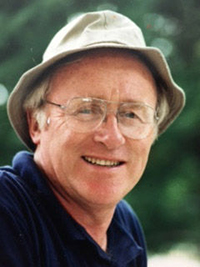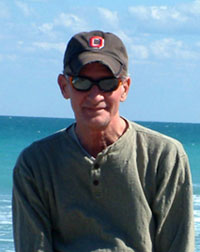Call for Posters for 2026
The Wilhelm-Keiffer Award Committee of the International Society of Landscape, Place, and Material Culture announces the guidelines for this year’s award and encourages all eligible students to present a poster at the 2026 Annual Conference which will be held in York, Pennsylvania, in the fall. Learn more about the conference here.
In honor of the contributions of both Dr. Hubert Wilhelm and his protégé, Dr. Artimus Keiffer, the Wilhelm family has generously agreed to sponsor the Wilhelm-Keiffer Student Research Award which will provide current and recently graduated undergraduate students with the opportunity to compete for a research award in the field of material culture studies.
This award includes a $250 reimbursement towards conference travel, a reimbursement of the student’s conference registration and awards banquet, a one-year ISLPMC student membership, and an engraved plaque.
- Students in any ISLPMC-relevant field (including but not limited to Geography, Environmental Studies, Anthropology, Folk Studies, Preservation, Landscape Architecture, Landscape Studies, Archeology, Sociology) who are working toward an undergraduate degree in an accredited program, or who have graduated from such a program within one academic year of the submission deadline, are eligible for the Wilhelm-Keiffer Student Research Award. Work presented on the poster must be from undergraduate research.
- The applicant will present a poster at the annual ISLPMC meeting during a designated Poster Session. The poster and accompanying presentation should demonstrate 1) scholarly merit, 2) quality topic selection and organization, and 3) well-crafted uses of theory, methodology, and field work.
- The deadline for submissions is 5 pm, September 15. A max 300-word abstract (the same as what is submitted with registration) accompanied by a one-page statement of the student’s interest in place, landscape, and/or material culture, broadly defined, must be sent to the Wilhelm-Keiffer Award Chair by the deadline. Submissions for the award should be sent as a Word (.doc/x) or PDF document directly to the Wilhelm-Keiffer Award Committee Chair, Dr. Chris Post, , via email at cpost2@kent.edu. Any questions may also be directed to Dr. Post, Dr. Ellen Hostetter (ehostetter@uca.edu), or Dr. Adam Payne (aap0047@auburn.edu).
- Three judges will select the winner. The winner will be notified at the conference.
- Interested students may want to consult the Conference Overview for complete conference information.
Guidelines
Each poster submitted to the competition will be evaluated for its quality reporting of original research undertaken by the author for its graphic presentation, and for its oral defense and explanation when presented to judges. Content will be the primary criterion in the written evaluation, but the author should use proper English as well as appropriate illustrations and documentation. The weight for each category is: 1) 60% for the poster’s textual content and visual acuity, and 2) 40% for the oral communication of the work and its merit.
Maps, illustrations, and other graphics should be designed and constructed by the author. No multiple authored posters will be accepted (an exception will be made where a student co-authors with a professor and said professor is second author). All topics broadly related to geography, landscapes studies, material culture studies, preservation, and other fields represented in the mission of ISLPMC may be entered and will receive a critical and impartial evaluation.
The evaluation of the visual presentation of the poster will include quality, appropriateness, and visual appeal of maps, figures and illustrations. Materials should be of professional quality and legible from a distance of one to three feet. Text should be limited but fully explain the project’s objective, evidence, analysis, and conclusion. Maximum poster dimensions are 36 by 48 inches.
The evaluation of a student’s ability to discuss the poster is independent of its textual and visual content and will focus on the professional quality of the presentation and the adequacy with which questions are answered. It is important that the oral presentations be lively and well-illustrated. The visual quality of the presentation is also important in determining the final evaluation. All visual aids should be intelligible.
Applicants will be encouraged to submit written papers on their poster’s topic to P.A.S.T. (the Pioneer America Society Transactions conference proceedings) or to Material Culture, the Society’s peer-reviewed journal.
On behalf of ISLPMC, it is our privilege to recognize up and coming students in the study of material culture with the Wilhelm-Keiffer Student Research Award. This award will, hopefully, stimulate interest in a subject that affects all of us in myriad ways.
About Drs. Wilhelm and Keiffer
 Dr. Hubert G.H. Wilhelm received his Ph.D., which focused on German settlement in Texas Hill Country, from Louisiana State University in Baton Rouge, Louisiana, under renowned cultural geographer, Dr. Fred B. Kniffen. Dr. Wilhelm joined the Department of Geography at Ohio University in Athens, Ohio, during 1963. He continued to teach for more than 30 years at Ohio University, where he is considered the father of the Department of Geography. In addition, he was twice honored as a University Professor for his teaching excellence while at the same time conducting research on North America's built landscape, especially the diffusion of folk buildings (houses and barns), migration and ethnic settlement patterns. His most recent publications include Barns of the Midwest, a cooperative editorial effort with Allen G. Noble, and two chapters in the two volume work, The National Road, edited by Karl Raitz. Dr. Wilhelm’s continued enthusiasm and emphasis on material culture – ethnic landscapes, barns, and other forms of vernacular architecture – have inspired many to follow in his footsteps. In fact, he has supervised graduate research for many students who went on to have illustrative careers, mostly in the private sector. He has been a long-time member of PAS: Association for the Preservation of Artifacts and Landscapes, and Dr. Wilhelm is recognized as one of today’s foremost experts on Ohio’s agricultural landscape.
Dr. Hubert G.H. Wilhelm received his Ph.D., which focused on German settlement in Texas Hill Country, from Louisiana State University in Baton Rouge, Louisiana, under renowned cultural geographer, Dr. Fred B. Kniffen. Dr. Wilhelm joined the Department of Geography at Ohio University in Athens, Ohio, during 1963. He continued to teach for more than 30 years at Ohio University, where he is considered the father of the Department of Geography. In addition, he was twice honored as a University Professor for his teaching excellence while at the same time conducting research on North America's built landscape, especially the diffusion of folk buildings (houses and barns), migration and ethnic settlement patterns. His most recent publications include Barns of the Midwest, a cooperative editorial effort with Allen G. Noble, and two chapters in the two volume work, The National Road, edited by Karl Raitz. Dr. Wilhelm’s continued enthusiasm and emphasis on material culture – ethnic landscapes, barns, and other forms of vernacular architecture – have inspired many to follow in his footsteps. In fact, he has supervised graduate research for many students who went on to have illustrative careers, mostly in the private sector. He has been a long-time member of PAS: Association for the Preservation of Artifacts and Landscapes, and Dr. Wilhelm is recognized as one of today’s foremost experts on Ohio’s agricultural landscape.
 Dr. Artimus Keiffer received his Ph.D. from Kent State University, but his inspiration to observe the landscape came directly from Dr. Wilhelm who supervised Dr. Keiffer’s masters thesis entitled, “The Settlement Landscape as Key to Highway Change: U.S. Route 50 between Athens and Coolville, Ohio.” In 1996, the two co-authored a chapter on the National Road in Ohio for A Guide to the National Road. In his research dealing with architectural styles, Dr. Keiffer emphasized the importance of technology as a major factor in changing residential house design, and he formulated a typology for classifying house types based on technological variables. Dr. Keiffer edited the Society’s journal, Material Culture, from 2002 to 2007, and in 2008, co-edited the journal. In 2008, he completed the second edition of The Geography of Ohio. By the end of his academic career, Dr. Keiffer had taught at Ohio University, University of Akron, Kent State University, Ohio Wesleyan University, Indiana University-Purdue University at Indianapolis, Franklin College, Valparaiso University, and finally at Wittenberg University. Every aspect of Dr. Keiffer’s work was inspired by his mentor, Dr. Wilhelm, and he frequently attributed to Dr. Wilhelm a remark that reflects the objectives of the International Society for Landscape, Place and Material Culture: “We need to know where we have been to understand where we are now to set the stage for where we are going in the future.”
Dr. Artimus Keiffer received his Ph.D. from Kent State University, but his inspiration to observe the landscape came directly from Dr. Wilhelm who supervised Dr. Keiffer’s masters thesis entitled, “The Settlement Landscape as Key to Highway Change: U.S. Route 50 between Athens and Coolville, Ohio.” In 1996, the two co-authored a chapter on the National Road in Ohio for A Guide to the National Road. In his research dealing with architectural styles, Dr. Keiffer emphasized the importance of technology as a major factor in changing residential house design, and he formulated a typology for classifying house types based on technological variables. Dr. Keiffer edited the Society’s journal, Material Culture, from 2002 to 2007, and in 2008, co-edited the journal. In 2008, he completed the second edition of The Geography of Ohio. By the end of his academic career, Dr. Keiffer had taught at Ohio University, University of Akron, Kent State University, Ohio Wesleyan University, Indiana University-Purdue University at Indianapolis, Franklin College, Valparaiso University, and finally at Wittenberg University. Every aspect of Dr. Keiffer’s work was inspired by his mentor, Dr. Wilhelm, and he frequently attributed to Dr. Wilhelm a remark that reflects the objectives of the International Society for Landscape, Place and Material Culture: “We need to know where we have been to understand where we are now to set the stage for where we are going in the future.”
The Awards Committee
Christopher W. Post, Chair | cpost2@kent.edu
Ellen Hostetter | ehostetter@uca.edu
Dr. Adam Payne | esvidon@esf.edu
Recipients of the Wilhelm-Keiffer Student Research Award
2025: Peter Kyriacou, South Florida University for “Curators and Cemi Idols: The Museum Afterlives of Material Personhood.”
2024: No Award Given
2023: Faith Quist, University of Missouri, for “North Korean Defection Patterns and Sense of Place.”
2022: Morgan Hurt, University of Missouri, for “Since Waldmire: A Comparative Photo Analysis of Two Midwestern College Towns.” Also, a Poster Presentation of Distinction Award was presented to Joseph Kinney, Castleton University, Vermont, for “Maranville’s Cherokee Balsam! The Patent Medicine of Robert E. Maranville.”
2018: Kristina Doering
2013: Sarah Jones Weicksel, University of Chicago, “From Home Front to Battlefield: Clothing and Technology in the American Civil War Era.”
2012: Kristin Britanik, University of Maryland, “Where are the Ladies’ Rest Rooms? The Evolution of Women-Only Resting Rooms Amid Social Changes of the Early Twentieth Century”
2011: The award was not offered in 2011.
2010: Nina Vollenbroker of the Bartlett School of Architecture, University College, London, England, UK, for her paper entitled, “Rootedness in Mobility — Identity, Space and Spatial Relationship in the Nineteen-Century American West.”
2008: Amy Potter, Louisiana State University, There’s No Place Like Home: Rebuilding Community in the Lower Ninth Ward
